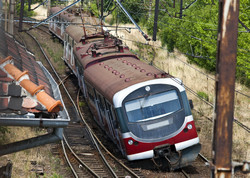Reducing the occurrences and impacts of freight train derailments
European railways suffered over 600 freight train derailments costing over EUR 200 million per year, in the decade prior to 2013. Preventing derailments would lead to large improvements in European rail services. However, their causes must first be known. With this in mind, the EU-funded D-RAIL(opens in new window) (Development of the future rail freight system to reduce the occurrences and impact of derailment) project sought to prevent derailments and mitigate their impacts. Work began with a review of recent derailments, their causes and likely indicators. It included the economic and social effects of derailments as well as the needs of the European rail market as it approaches 2050, and considered technologies emerging in that timeframe which could be of benefit in preventing derailments and mitigating their impacts. A cost-benefit analysis was performed to determine the economic effects of carrying out various supervision and mitigation measures. Another analysis dealt with the causes, consequences and potential prevention measures of derailments. It also identified and assessed key factors in derailment. The analysis led to cost-effective solutions to minimise or eliminate derailment and deliver enhanced safety levels. Project partners studied existing inspection and monitoring techniques on prevention and mitigation. Monitoring techniques and safety measures were tested, and novel innovative technologies were demonstrated and validated for both track and freight vehicles. The team also looked at how to integrate the existing and emerging monitoring and mitigation systems throughout the rail system. D-RAIL technical and economic assessments demonstrated that freight train derailments across Europe and their associated costs can be reduced by 8-12 % and 10-20 %, respectively. This will benefit both rail stakeholders and European society. Furthermore, the project will help promote the attractiveness of rail freight and mitigate the potential negative environmental impact.



